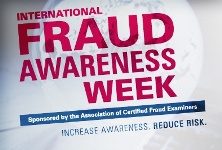5 Proven Analytic Methods to Discover Fraud in Data
/ GUEST BLOGGER
GUEST BLOGGER
Scott Patterson
ACFE Media Relations Specialist
To wrap up Fraud Week, I’d like to pass along some words of wisdom from one of this year’s new Official Supporters, Centrifuge Systems. Renee Lorton, Centrifuge’s CEO, wrote to us about the importance of analyzing and evaluating data in any effort to detect and prevent fraud.
“Big data is everywhere. Customer data. Social networking data. External watch sites. Industry lists,” Lorton wrote. “With more data comes the opportunity for hidden crimes of collusion -- criminal rings of behavior that span global business networks. International Fraud Awareness Week is a call to action to tame this jungle of data.”
So these tips are for the “data guardians.” Lorton provides five proven analytic methods to discover fraud in your data:
- Integrate disparate data sources enabling your analysts to connect the dots and reveal the truth. This could include business line data, fraud alerts, customer transaction records, employee data or invoices.
- Profile your data first. Charts and histograms can be very effective ways to understand the data values you are working with. These initial profiles will point you in the right direction for more advanced analysis which may include creating new variables and defining relationship maps.
- Extend your current analysis techniques to include interactive data visualization. You will find that different forms of charts, time lines, tables and relationship graphs reveal unique insights that predictive technologies and rules based systems simply can't find.
- Use "visual cues" when analyzing relationship graphs. These can include link directions, size of nodes and width of links. These visual cues allow you to quickly identify interesting parts of the graph. For example, you can quickly pinpoint people with similar addresses or large financial transactions.
- Document and share insights throughout the investigation. As you reveal key findings, hidden relationships or unusual behavior, document your results. Tracking the discovery process over time will be invaluable as you educate others on how you arrived at your conclusions. Sharing results with other fraud analysts should speed up the investigation.
Thank you to Centrifuge Systems, and all of our Official Supporters, for making this an amazing week of raising awareness and shining a spotlight on white-collar crime.
Until next year...




